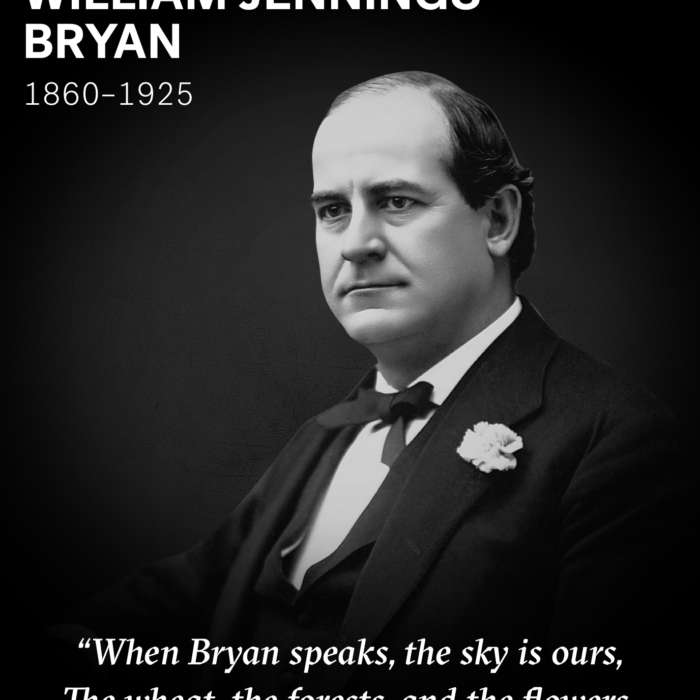
Dates: 1860–1925
Quote: When Bryan speaks, the sky is ours,
The wheat, the forests, and the flowers. And who is here to say us nay?
Fled are the ancient tyrant powers.
Quote credit: Vachel Lindsay, poet, 1915
Image credit: Library of Congress / Corbis / VCG via Getty Images
Synopsis copy: William Jennings Bryan championed the teachings of Jesus and Jefferson in advocating for the rights of workers and women, regulation of big business, reform of campaign finance, progressive taxation, and world peace.
Image credit: Niday Picture Library / Alamy Stock Photo
Bubble copy: Bryan was a “paragon of eloquence,” who animated his speeches with biblical references and quotes. He drew massive audiences with winsome oratory, transforming the nature of political campaigns and American politics.
Image Caption: William Jennings Bryan speaks to a crowd of people, 1896
Image credit: CORBIS/Corbis via Getty Images
Bubble copy: Bryan’s “Cross of Gold” speech is his most known. In it he denounced the gold Standard and proclaimed: “You shall not press upon the brow of Labor this crown of thorns, you shall not crucify mankind upon a cross of gold.”
Image caption: Bryan delivered his “Cross of Gold” speech at the Democratic National Convention on July 9, 1896.
Image credit: Library of Congress
Bubble copy: Bryan outlined the link between faith and liberty in his 1903 Thanksgiving Day speech. He said, “When God created man, He gave him life. He linked to life the love of liberty, and what God hath joined together let no man put asunder.”
Image caption: Bryan delivered the speech in London, England.
Image credit: Library of Congress
Bubble copy: In 1907, Bryan spoke on the topic of faith, asserting: “Faith exerts a controlling influence over our lives. If it is argued that works are more important than faith, I reply that faith comes first, works afterwards.”
Image caption: Bryan addresses a large crowd in 1907. Image credit: Bettmann / Getty Images
Bubble copy: In his 1904 “Prince of Peace“ speech, Bryan said, “I offer no apology for speaking upon a religious theme, for it is the most universal of all themes. … I would rather speak on religion than on politics.”
Image caption: Bryan’s engaging speaking style captivated large audiences across the country.
Image credit: Bettmann / Getty Images
Body copy: A populist known as the “Great Commoner” in his service as Congressman, three-time Presidential candidate, and Secretary of State, Bryan believed, “God is on the side of the common man and woman.”
Image caption: Bryan in front of the storefront window of his weekly paper, The Commoner, 1905
Image credit: CORBIS/Corbis via Getty Images
Body copy: Bryan was the Democratic Party’s nominee for President in 1896, 1900, and 1908. His progressive populism shook up the Party’s traditional “Bourbon” establishment and energized a grassroots base for reform.
Image caption: Election materials from Bryan’s 1908 Presidential Campaign
Image credit: Popperfoto via Getty Images/Getty Images
Body copy: A Christian liberal of evangelical conviction and fervor, Bryan was loved by his base of populists.
Image caption: Menu cover featuring Bryan with Presidents Jefferson and Jackson for an event held by the Jefferson Club, 1908
Image credit: New York Public Library [Image file name]
Body copy: Bryan’s Christian liberalism transformed the Democratic Party into a force for reforms like the progessive income tax, direct election of senators, women’s suffrage, money and banking regulation, and labor laws.
Image caption : Cartoon from Puck magazine depicting Bryan’s populism as a snake swallowing a donkey—the Democratic Party, 1900
Image credit: Library of Congress
Body copy: As counsel for the State of Tennessee, Bryan helped prosecute John T. Scopes, a public school teacher charged with violating state anti-evolution law. The trial raised debate about parental rights and academic freedom.
Image caption: Bryan in the Dayton, TN, courtroom arguing for the prosecution in July, 1925
Image credit: Hulton Archive / Staff
Body copy: Bryan died of diabetes in Dayton just five days after the Scopes Trial. His disease was likely aggravated by the summer heat and exhaustion. He is remembered as one of the most influential men of the Progressive Era.
Image caption: The New York Times reports Bryan’s death, on July 26, 1925.
Image credit: The New York Times © 1925 The New York Times Company
Question/alignment statement: Do you think that biblical teaching about the sacredness of life fosters democracy?
Image credit: Tom Williams / Contributor
Scripture: A word fitly spoken is like apples of gold in pictures of silver.
Scripture credit: Proverbs 25:11
Image credit: Universal History Archive/Universal Images Group via Getty Images
Related changemakers: Jane Addams, Jeremiah Evarts, Frederick Douglass